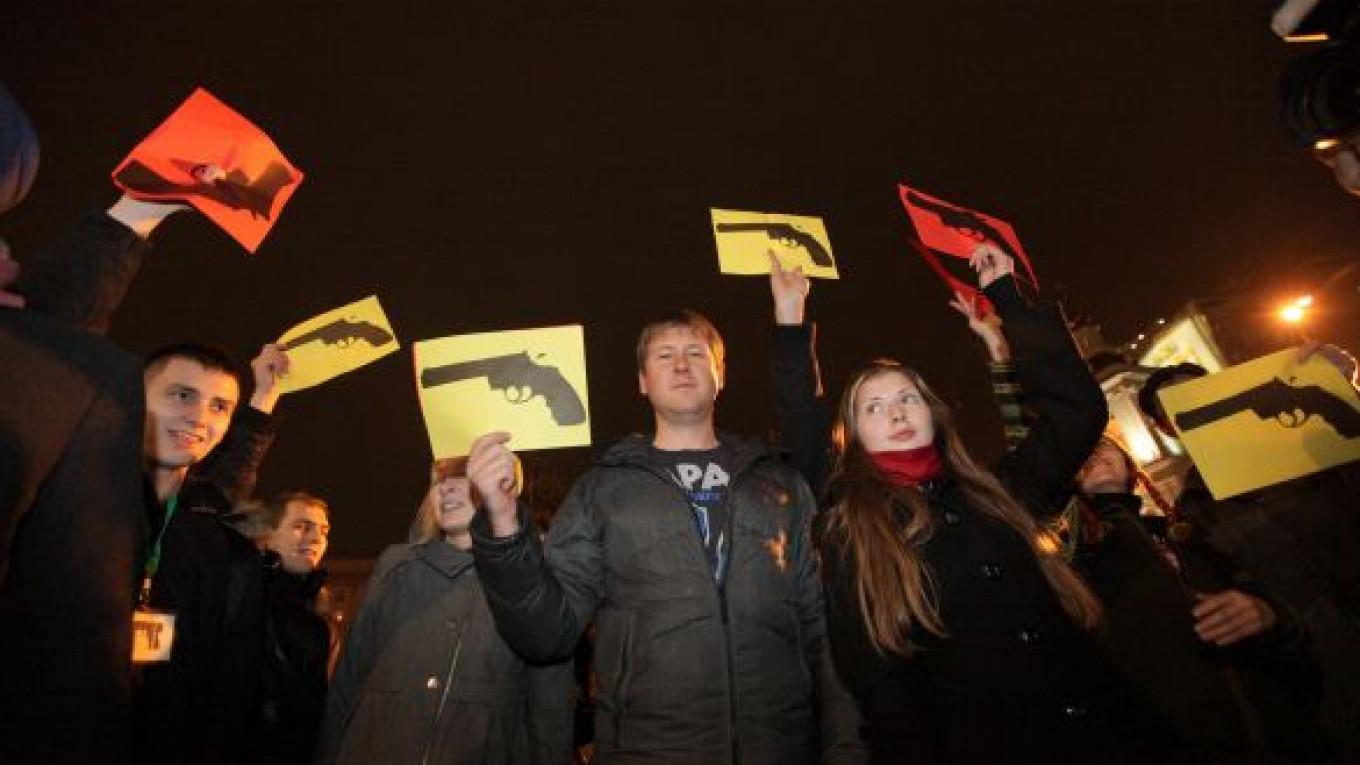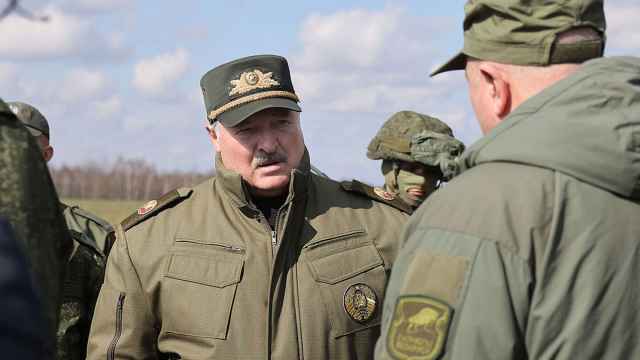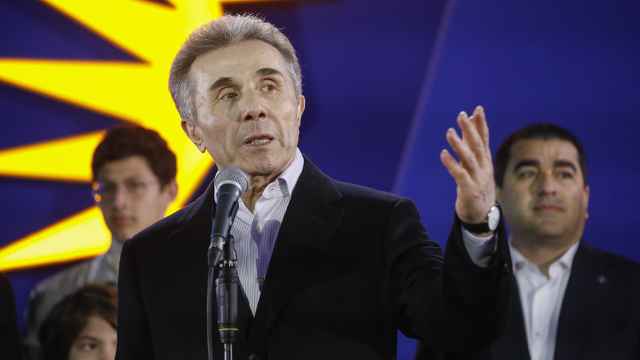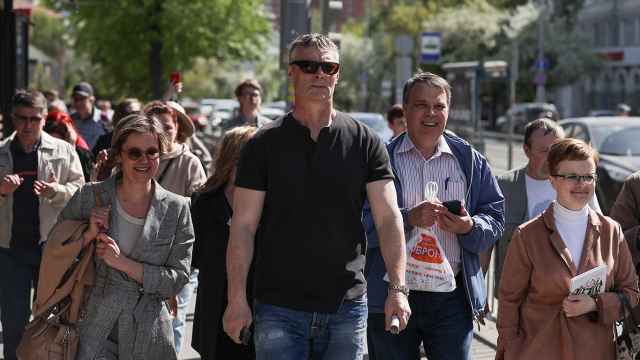Days after a gunman killed 12 people in a U.S. movie theater, a Federation Council senator has announced a push to ease Russia's strict firearms rules.
But experts and activists on Wednesday decried Alexander Torshin's initiative as a mere publicity stunt without any real chance for success.
Torshin, who is the Federation Council's first deputy speaker, presented a report this week that argues that legalizing handguns would increase public safety and improve society as a whole.
"Possessing arms disciplines us and will change the atmosphere in society because people will no longer act lawlessly," he told a public hearing in the Federation Council on Tuesday, according to Interfax.
Torshin's initiative is a first step toward changing public and law enforcement attitudes about private gun ownership, said Dmitry Kislov, spokesman of the Right to Arms public movement, which co-authored Torshin's report.
"Police usually oppose easing firearms control because it gives them more work," he said by telephone Wednesday.
Kislov said the aim should not be to arm citizens indiscriminately but to make the use of arms possible for those who can use them responsibly.
He acknowledged that the timing of the release of Torshin's report, less than four days after the shooting in Aurora, Colorado, was unfortunate.
"This was a huge tragedy, and we feel very compassionate about the victims. But we know the realities in U.S. society well and can say that this is not typical," he said.
The 114-page report, which can be from Torshin's website, also argues that legalizing firearms possession would have economic benefits for the national arms industry.
But Torshin denied that he was lobbying any business interests. The senator represents the Volga republic of Marii-El in the upper house of parliament. The country's biggest arms manufacturers, including the maker of the legendary Makarov pistol, the Izhevsk Mechanical Plant, are located in the further eastern republic of Udmurtia.
Torshin suggested conducting a referendum about the issue and said he wouldn't start drafting a bill before parliament starts work again in the fall. He conceded that it might be too soon to change the law. "A bill will be submitted only when it is clear that this is not a waste of legislators' time," he said.
According to opinion polls, most Russians oppose legalizing the use of firearms. A survey by the independent Levada Center last year found that only 13 percent of respondents approved, while 80 percent opposed and 7 percent refused to answer, said Alexei Grazhdankin, the center's deputy director.
He said this has changed little over the past 20 years and that a survey in 1991 had found similar results. "It is a legacy of the Soviet Union that people believe that the state has a duty to protect them," Grazhdankin said by telephone.
Unsurprisingly, government agencies and the ruling United Russia party, of which Torshin is a member, reacted with skepticism.
"The Cabinet believes that such decisions are untimely, and it is obvious that they cannot be adopted," an unidentified government official told Izvestia in Wednesday's edition. The official added that law enforcement agencies should remain responsible for public safety.
Pavel Krasheninnikov, the head of the State Duma's Legislative Committee and a United Russia member, said that easing gun controls would lead to a huge increase in the number of shootings. He noted that up to a third of the country's inmates are convicted of stabbings and other violent assaults. "Imagine if they would all commit shootings," he told Kommersant.
Lawmakers actually tightened gun laws last year, passing a bill that tightens the purchase of air guns, which are classified as non-lethal.
Gas pistols and related guns are widely available in the country, leading to a spike in dangerous incidents. The Interior Ministry registered some 1,500 air gun incidents between 2005 and 2010, 60 of which ended in fatalities.
Torshin himself admitted that the Interior Ministry had sent him an official note of disapproval about his initiative. But he argued that the Kremlin had nothing against the idea. "The presidential administration is laid back about this. They neither support it nor oppose it," he said.
Kislov, of the Right to Arms, said about 4 million Russians now legally own 6.5 million firearms in the country, but only with licenses that limit their use to hunting and self-defense on private premises. He said it would significantly boost safety if these arms could be carried on the streets legally. "These people are very law abiding and could save many lives," he said about the license holders.
Kislov also dismissed fears that widespread corruption would make it easy to get licenses despite a criminal record or mental health problems. "Real life shows that corruption in this particular field is low," he said.
His movement on its website that it has about 700 supporters across the country.
Human rights activists said they were frightened by the prospect of legalizing firearms. "I think it will just lead to more fatal incidents, especially with regard to the radical nationalist youth," said Tanya Lokshina of Human Rights Watch's Moscow bureau.
A Message from The Moscow Times:
Dear readers,
We are facing unprecedented challenges. Russia's Prosecutor General's Office has designated The Moscow Times as an "undesirable" organization, criminalizing our work and putting our staff at risk of prosecution. This follows our earlier unjust labeling as a "foreign agent."
These actions are direct attempts to silence independent journalism in Russia. The authorities claim our work "discredits the decisions of the Russian leadership." We see things differently: we strive to provide accurate, unbiased reporting on Russia.
We, the journalists of The Moscow Times, refuse to be silenced. But to continue our work, we need your help.
Your support, no matter how small, makes a world of difference. If you can, please support us monthly starting from just $2. It's quick to set up, and every contribution makes a significant impact.
By supporting The Moscow Times, you're defending open, independent journalism in the face of repression. Thank you for standing with us.
Remind me later.







